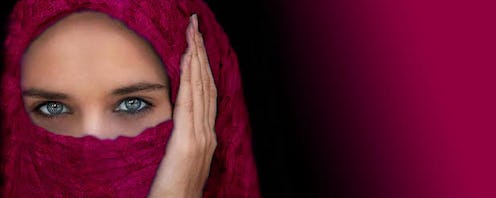Life
This 16-Year-Old Will Inspire You

At the age of 16, most of us are more concerned with high school gossip and cramming for tomorrow's history exam than changing the world. But Amara Majeed is clearly not most 16-year-olds. As an American Muslim, Amara has launched an effort called The Hijab Project, which seeks to promote understanding and communication between Muslims and non-Muslims in America. And when not doing that, she teaches English to girls in Muslim countries. Consider us impressed.
The Hijab Project is a website that provides a space for hijab-wearing Muslim women to share stories about their experiences. The project also encourages non-Muslim women to wear a hijabs in public places (like a mall) and then write about their observations. She hopes that the project will help non-Muslim women to better understand the difficulties that women who wear the hijab face, both by reading the stories of these women and getting a taste of the experience themselves.
The practice of non-Muslim women trying out the hijab, sometimes called "hijab tourism" has become somewhat controversial in recent years. Recently, after the creators of Wold Hijab Day encouraged non-Muslim women to wear the hijab for the day, a #NoToHijabAppropriation hashtag starting trending on Twitter in protest of the move. One of the co-creators of the hashtag explained that she feels wearing the hijab for this purpose "transforms the idea of the hijab into a costume and encourages women to play dress-up for the day." Others also criticized the event for drawing attention away from the narratives of Muslim women themselves, and instead focusing on those of women with only a day's worth of experience with the hijab.
However, Amara Majeed still feels that these sorts of narratives can be "extremely valuable" alongside the stories of Muslim women in that they help bridge the gap of understanding between Muslim and non-Muslim women. Several of her friends have tried wearing the hijab and, she says, found it to be an eye-opening experience. This is why her site aims to feature both types of narratives.
Majeed feels there to be many misunderstandings about the hijab and about the American Muslim community. She herself finds the hijab to be "liberating," despite what others might think. "People see me for who I am rather than what I look like," she told Bustle.
Other women on the website also talk about the ways in which wearing the hijab is meaningful to them. One contributor says is makes her "feel beautiful and so empowered," while another writes that it is a "great feeling" and helps her feel "close to Allah." Another says it "makes her feel complete."
However, each of the contributors also seems to have a story about ignorance or discrimination they've faced for wearing the hijab. It's very clear that there are still widespread misconceptions and prejudices regarding what Amara and her contributors consider to be a meaningful personal choice. "After reading so many stories from my site," she says, "I learned that hijabis often feel oppressed by classmates, friends, and people who judge them."
On her site, women recall being called terrorists, singled out in airports, or treated as though they are "quiet, vulnerable, weak, stupid, or otherwise simple-minded." Plenty recall negative reactions from their family members — in both Muslim and non-Muslim families — when they decided to start wearing the hijab. And many, many women have stories to tell about offensive questions from strangers.
In America, the growing Muslim community continues to be viewed all too often with suspicion, and the hijab is the most visible symbol of that other-ness. As Majeed observes, "a woman needn't have a different skin color, a foreign accent, or an unusual name, because when she decides to wrap a piece of cloth around her head, she immediately becomes 'un-American,' or 'foreign.'"
But by giving women from both sides of the divide a chance to share their stories, Majeed hopes that things will change for the better. It's a big goal for a high school student, but Majeed has big plans. She's hoping to collect as many stories as possible and to add a hijab store to the site for women who might not know where to buy a hijab on their own. And she's also looking to expand her efforts to teach English to girls in Islamic countries, where she says its important to empower people "to change anti-feminist customs, to rebel against a corrupt government, [and] to help people in need." And to think she's only still 16; definitely an up-and-coming activist to keep your eye on.
Image: The Hijab Project